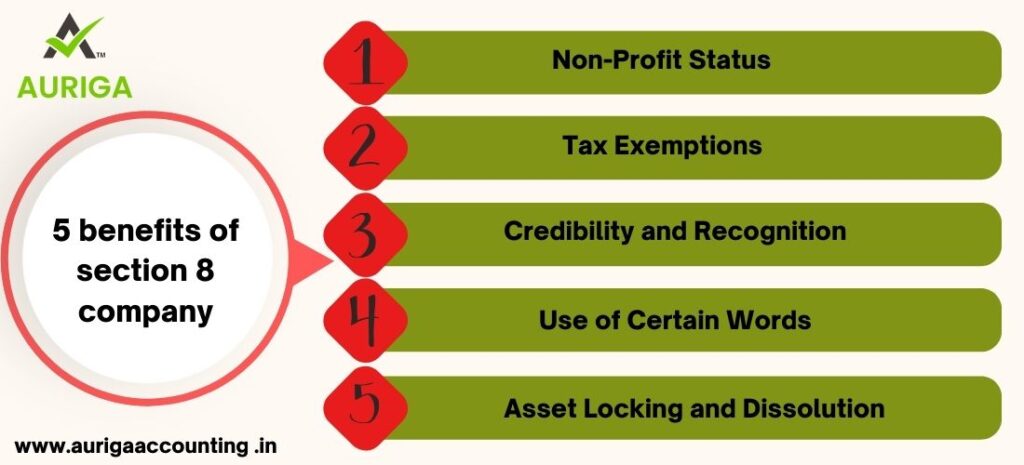
CAN A COMPANY UNLIMITED LIABILITIES BE REGISTERED AS A SECTION 8 COMPANY?
Introduction
ToggleYOU NEED TO KNOW CAN A COMPANY UNLIMITED LIABILITIES BE REGISTERED AS A SECTION 8 COMPANY?
In India, the corporate landscape offers a variety of legal structures and entities to facilitate business and non-profit activities. Two such structures are companies with unlimited liabilities and Section 8 companies. While each has its unique characteristics and purposes, there may be situations where a company with unlimited liabilities desires to transition into a Section 8 company, primarily to undertake non-profit or charitable activities while enjoying the advantages and legal recognition that Section 8 companies offer.
This comprehensive guide will explore the process, challenges, and considerations involved in transitioning a company with unlimited liabilities to a Section 8 company in India. It covers the legal and procedural aspects, as well as the advantages and limitations of this transition. Visitofficialwebsite
UNDERSTANDING COMPANIES WITH UNLIMITED LIABILITIES
Companies with unlimited liabilities are a type of business structure that is relatively rare in modern Indian corporate practices. These companies are characterized by the following key attributes:
Unlimited Liability: In a company with unlimited liabilities, the members or partners have personal and unlimited liability for the company’s debts and obligations. This means their personal assets, if necessary, can be used to settle the company’s financial obligations.
For-Profit Orientation: Companies with unlimited liabilities are typically structured for for-profit business activities. They are not explicitly designed for non-profit, charitable, or social welfare purposes.
Flexibility in Profit Distribution: These companies have more flexibility in distributing profits to their members or partners, as long as the members are willing to assume the associated unlimited liabilities.
UNDERSTANDING SECTION 8 COMPANIES
Section 8 companies, on the other hand, are a specific category of non-profit organizations in India, governed by the Companies Act, 2013 (formerly by the Companies Act, 1956). They are designed to promote charitable, non-profit, and social welfare objectives. The key features of Section 8 companies include:
Non-Profit Orientation: Section 8 companies are explicitly established for non-profit and charitable activities. They are not driven by profit-making motives, and any income they generate must be reinvested in furthering their non-profit objectives.
Limited Liability: Members and directors of Section 8 companies enjoy limited liability. This means their personal assets are protected from the company’s financial obligations.
Legal Recognition: These companies have legal recognition, offering credibility and structure for their charitable activities.
License Requirement: Section 8 companies must obtain a license from the Central Government (specifically, the Registrar of Companies) to operate. This license confirms the company’s commitment to non-profit objectives.
CHALLENGE AND CONSIDERATION
Change in Business Model: The transition involves a significant shift from a for-profit business model to a non-profit, charitable one. This change can impact the company’s operations, revenue streams, and financial sustainability.
Liability Issues: Members of a company with unlimited liabilities may need to address their personal liability concerns, as they will typically enjoy limited liability as members of a Section 8 company.
Legal and Regulatory Compliance: Section 8 companies are subject to specific legal and regulatory requirements related to non-profit activities. Adhering to these requirements can be administratively burdensome.
License Requirement: Obtaining a license from the Registrar of Companies to operate as a Section 8 company is a critical step, and the application process can be time-consuming.
Objective Alignment: The company must ensure that its objectives and activities align with the non-profit and charitable nature of Section 8 companies. This may require amending its memorandum and articles of association.
ADVANTAGES OF TRANSITION
Transitioning from a company with unlimited liabilities to a Section 8 company offers several advantages, including:
Non-Profit Focus: The transition allows the company to engage in non-profit and charitable activities, contributing to social welfare and other noble causes.
Limited Liability: Members and directors of the Section 8 company enjoy limited liability, protecting their personal assets.
Legal Recognition: Section 8 companies have legal recognition, providing credibility and structure for their non-profit activities.
Tax Benefits: Section 8 companies are eligible for tax exemptions and benefits, enhancing their financial sustainability.
Compliance: The transition ensures compliance with the legal and regulatory requirements for non-profit entities.
What is the limit of Section 8 company
Section 8 companies in India, governed by the Companies Act, 2013, do not have specific limits in terms of capital or revenue. However, there are key points and conditions associated with Section 8 companies:
Non-profit Objective: The primary purpose of a Section 8 company is to promote art, science, commerce, sports, education, research, social welfare, religion, charity, protection of the environment, or other charitable objectives. It must operate for the public good.
No Dividend Distribution: Section 8 companies are prohibited from distributing profits or dividends to their members. Any income generated must be utilized for the promotion of the company’s objectives.
License Requirement: To obtain the benefits of Section 8, the company must apply for and obtain a license from the Central Government. This license allows the use of terms such as ‘Foundation,’ ‘Forum,’ ‘Association,’ ‘Federation,’ ‘Chamber of Commerce,’ or ‘Council’ in the company’s name.
Asset Utilization: If the Section 8 company is dissolved, any remaining assets must be transferred to another Section 8 company or a non-profit organization with similar objectives.
Compliance: Section 8 companies must comply with the regulations outlined in the Companies Act, 2013. Regular filing of documents, maintaining proper accounts, and adherence to the stipulated rules are essential.
While there are no specific financial limits, Section 8 companies must operate with the sole purpose of advancing charitable objectives and in compliance with the regulatory framework.
Which section is not applicable to Section 8 company
Section 8 companies in India, also known as not-for-profit companies, are subject to most provisions of the Companies Act, 2013. However, certain sections of the Companies Act are not applicable to Section 8 companies. One notable example is:
Section 8 (3): This section pertains to the requirement of obtaining a ‘No Objection Certificate’ from the appropriate government authority for companies intending to use the words like ‘Board,’ ‘Authority,’ or ‘Government’ in their names. However, Section 8 companies are exempted from this requirement.
Apart from Section 8 (3), Section 8 companies may also be exempt from certain provisions related to the issuance of shares and payment of dividends since these companies are not intended to distribute profits among their members. The focus of Section 8 companies is on promoting charitable objectives rather than operating for commercial gain.
It’s important to note that the exemption or non-applicability of specific sections is designed to align with the non-profit nature of Section 8 companies and to facilitate their mission of serving the public good.
Can private company be Section 8 company
No, a private company cannot be registered as a Section 8 company under the Companies Act, 2013. Section 8 of the Companies Act, which deals with companies formed for promoting charitable objectives, specifically mentions that such companies can only be registered as either a company limited by guarantee or as a company with share capital.
Section 8 companies are essentially non-profit organizations that are formed to promote art, science, commerce, sports, education, research, social welfare, religion, charity, protection of the environment, or other charitable objectives. They operate for the public good and are subject to certain conditions, such as the prohibition of dividend distribution and the utilization of income for the promotion of their objectives.
Private companies, on the other hand, can be either limited by shares or limited by guarantee, but they are formed for profit-making purposes. Private companies aim to generate profits for their members or shareholders, and their activities are focused on commercial objectives rather than charitable or non-profit purposes.
In summary, a private company cannot be registered as a Section 8 company because the objectives and operational focus of these two types of companies are fundamentally different.
What is the minimum number of directors for Section 8
In accordance with the Companies Act, 2013:
Private Company: The minimum number of directors required for a private company is two.
Public Company: The minimum number of directors required for a public company is three.
Section 8 companies can be either private or public companies. Therefore, they need to comply with the general requirements for the minimum number of directors based on their classification.
It’s advisable to check the latest amendments to the Companies Act or consult with a legal professional or the Ministry of Corporate Affairs in India for the most up-to-date information regarding the minimum number of directors for Section 8 companies. Additionally, specific requirements may be mentioned in the company’s articles of association.
Is Section 8 company required to appoint company secretary
there is no mandatory requirement for a Section 8 company in India to appoint a Company Secretary. The requirement to appoint a Company Secretary is generally applicable to certain types and sizes of companies, and it is outlined in the Companies Act, 2013.
For private companies, the appointment of a Company Secretary is not mandatory unless the company’s articles of association explicitly make it a requirement. Public companies meeting certain criteria, such as paid-up share capital, are required to appoint a whole-time Company Secretary.
Section 8 companies, which are typically formed for charitable or not-for-profit purposes, are subject to specific regulations, but they are not explicitly required to appoint a Company Secretary by default. However, companies may choose to appoint a Company Secretary for administrative and compliance purposes, even if it is not mandated by law.
It’s advisable to check the latest amendments to the Companies Act or consult with a legal professional or the Ministry of Corporate Affairs in India for the most up-to-date information regarding the appointment of a Company Secretary for Section 8 companies.
What is the difference between Pvt Ltd and Section 8
Private Limited Company (Pvt Ltd) and Section 8 Company are two distinct types of legal entities under the Companies Act, 2013 in India, each with its own set of characteristics and purposes:
Private Limited Company (Pvt Ltd):
- Objective: Pvt Ltd companies are primarily formed for commercial purposes, aiming to generate profits for their shareholders.
- Ownership: These companies have private ownership, and shares are not freely transferable.
- Profit Distribution: Profits earned by a Pvt Ltd company can be distributed among its shareholders in the form of dividends.
- Shareholders: The number of shareholders in a Pvt Ltd company is limited, typically between 2 to 200.
- Board of Directors: The management of a Pvt Ltd company is overseen by a Board of Directors.
- Regulations: Pvt Ltd companies are subject to regulatory requirements, including filing annual financial statements and compliance with corporate governance norms.
Section 8 Company:
- Objective: Section 8 companies are formed for promoting charitable objectives such as education, art, science, sports, social welfare, religion, and more. They operate for the public good and are non-profit entities.
- Profit Distribution: Section 8 companies are prohibited from distributing profits among their members. Any income generated must be utilized for the promotion of their charitable objectives.
- Ownership: These companies may be formed as companies limited by guarantee or with share capital.
- License Requirement: Section 8 companies must obtain a license from the Central Government and can use certain words such as ‘Foundation,’ ‘Forum,’ ‘Association,’ or ‘Council’ in their names.
- Board of Directors: Like Pvt Ltd companies, Section 8 companies also have a Board of Directors responsible for overseeing the organization’s operations.
In summary, while Pvt Ltd companies focus on profit-making activities with private ownership, Section 8 companies are dedicated to non-profit, charitable purposes with restrictions on profit distribution. The choice between the two depends on the organization’s objectives and the nature of its activities.

5 benefits of section 8 company
Forming a Section 8 company in India, governed by the Companies Act, 2013, offers several benefits, particularly for organizations with charitable and non-profit objectives. Here are five key advantages:
Non-Profit Status: The primary benefit of a Section 8 company is its non-profit status. It allows organizations to operate with the sole purpose of promoting art, science, commerce, sports, education, research, social welfare, religion, charity, or other charitable objectives without the intention of earning profits for distribution among its members.
Tax Exemptions: Section 8 companies may be eligible for various tax exemptions, both at the state and central levels. They may qualify for exemptions on income tax, provided they comply with the prescribed regulations and conditions.
Credibility and Recognition: Being registered under Section 8 imparts a level of credibility and official recognition to an organization. This can be advantageous when seeking partnerships, donations, or collaboration with other entities, as stakeholders often view Section 8 registration as a commitment to social and charitable causes.
Use of Certain Words: Section 8 companies are allowed to use specific words in their names, such as ‘Foundation,’ ‘Forum,’ ‘Association,’ ‘Federation,’ ‘Chamber of Commerce,’ or ‘Council,’ without the need for further approvals. This facilitates better identification and association with their charitable objectives.
Asset Locking and Dissolution: In the event of dissolution, the assets of a Section 8 company must be transferred to another Section 8 company or a non-profit organization with similar objectives. This provision ensures that the assets are utilized for charitable purposes even if the original organization ceases to exist.
It’s essential to note that while Section 8 companies enjoy these benefits, they also need to comply with specific regulatory requirements, including obtaining a license from the Central Government, adherence to filing obligations, and limitations on profit distribution, to maintain their non-profit status and enjoy the associated advantages.
CONCLUSION OF REGISTERED AS A SECTION 8 COMPANY
Transitioning a company with unlimited liabilities to a Section 8 company involves a significant shift in business model, purpose, and structure. It requires careful consideration, legal expertise, and adherence to the complex regulatory requirements associated with Section 8 companies. While this transition can be challenging, it offers the opportunity to engage in non-profit, charitable, and socially responsible activities while enjoying limited liability and tax benefits. Before initiating such a transition, it’s advisable to consult with legal professionals and conduct a thorough evaluation of the company’s suitability for non-profit work.
HOW AURIGA ACCOUNTING HELP YOU TO REGISTER AS A SECTION 8 COMPANY
However, Auriga Accounting and consulting firms or organizations that specialize in corporate and non-profit services may offer assistance with the transition of a Section 8 company. These services can include:
Consultation: Providing information and guidance on the legal and regulatory requirements for transitioning a Section 8 company, including amending the memorandum and articles of association.
Legal Expertise: Assisting with the legal aspects of the transition, such as amending documents and ensuring compliance with non-profit regulations.
License Application: Preparing and filing the necessary forms and documents for obtaining a license from the Central Government (Registrar of Companies).
Compliance Support: Offering ongoing support for compliance with non-profit and charitable requirements, including maintaining proper accounts and filing annual returns.
Strategic Planning: Assisting in aligning the company’s new non-profit objectives and activities with the Section 8 company’s mission.
Tax Advisory: Providing advice on tax benefits and exemptions that Section 8 companies can avail themselves of.
If “Auriga Accounting” or a similar service provider is known for offering these types of services, you may consider contacting them directly or visiting their official website to learn more about their expertise and offerings related to transitioning Section 8 companies. It’s important to choose a reputable and knowledgeable service provider to ensure a smooth and successful transition process. Please note that the information about specific service providers or organizations may have evolved since my last update, so it’s advisable to conduct your own research and verify their services.












